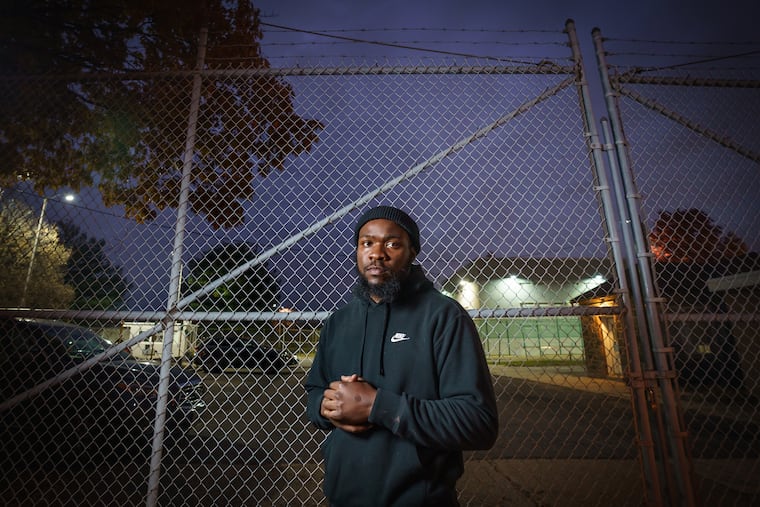Five days without a shower, not enough toilet paper, medical emergencies: What I experienced in a Philly jail | Opinion
Lucian Martin, who was incarcerated at Philadelphia’s Curran-Fromhold Correctional Facility for four months, shares his experience to encourage Philly's leaders to do more to help incarcerated people.

l want to tell you what it’s like to be incarcerated in a Philadelphia jail during the COVID-19 pandemic.
It is difficult for me to think about the filthy and degrading conditions I endured for four months, but I feel it is my duty to share my story on behalf of those still incarcerated. I want to open the public’s eyes to what’s taking place within those walls.
During my intake, I was crammed in a small cell with up to 12 other people with no opportunity to social distance for two days. Many of us were forced to sleep on the floor. The intake process, which usually takes a few hours, now often lasts two to four days since the pandemic began.
Once I made it through the process and was assigned a cell, it only got worse.
Normally, incarcerated people are allowed out of their cells every day for at least six hours. But during the pandemic, we were locked down in our cells for 24 hours a day, often for multiple days in a row. Once, I was not let out of my cell for 120 hours. That’s five days without being allowed to leave my cell, without the chance to shower, to socialize, or to speak with my children and loved ones.
This wasn’t just my experience — it was the experience of everyone in my housing block.
» READ MORE: Philly’s shockingly inhumane prison conditions | Opinion
Over the course of my four-month stay, I never received any changes of sheets, towels, or washcloths, nor any additional uniforms beyond the one I received upon entry. We were given only one roll of toilet tissue per two individuals each week, which isn’t nearly enough. This often resulted in people having to use their personal belongings to clean themselves.
One day, one of my former cellmates suffered a seizure and there was not a corrections officer on the unit at the time. By the time they responded, it took medical staff 20 additional minutes to arrive on the scene. In all, my former cellmate was seizing for around 45 minutes. I felt so helpless, angry, and frustrated that I could not do more and that they were not doing enough.
Another incarcerated man had a seizure one evening while I was there. His cellmate was banging on the door trying to alert someone so this man’s life could be saved. No corrections officer came on the block until the next morning, at which time the gentleman was already deceased.
These stories only touch the surface of what I witnessed in the Philadelphia jails. The treatment we experienced was nearly unbearable and the traumatic events I witnessed will stay with me forever.
I fear for every young man, like my son, who could be subjected to these horrifying conditions.
As a Black man, I find it impossible to write about this without drawing comparisons to the hateful abuse of our ancestors, the horrific years of slavery and the Jim Crow era. Like them, people in Philly jails, many of them Black and brown, have been subjected to the same rituals of degradation. We were ripped away from our families, isolated from human contact, abused, and neglected without any repercussions. Speaking about these inhumanities makes me physically sick to my stomach because I just cannot comprehend how human beings can be treated like this by our own government.
The catastrophic state of Philly jails amount to nothing less than state-sanctioned violence.
It feels as if the city does not respect incarcerated people as human beings who deserve dignity. Our mental and physical well-being does not seem to matter to the elected leaders who make decisions about how to keep incarcerated people safe.
» READ MORE: ‘We need help’: Video, reports depict violence and ‘riots’ at Philadelphia jails
Our elected leaders must stop letting this catastrophe continue. This is a real crisis. It has a devastating impact not only on those who are incarcerated but on our families as well. Everything we suffer, mentally and emotionally, they bear as well. Nearly everyone in our jails will return home to their communities and families eventually. Is subjecting them to misery, violence, and untold trauma for months on end going to help those coming home become any more likely to survive and thrive in their communities? Surely not.
On behalf of those incarcerated in Philly jails and their loved ones, I implore city leaders to take action now. Mayor Jim Kenney and City Council should clean up the city’s jails and ensure living conditions drastically improve by creating educational opportunities, access to daily showers, and out-of-cell opportunities. Judges and District Attorney Larry Krasner should also release people from these chambers of neglect and stop holding our community members and their family members hostage to unjust practices like cash bail and prolonged probation detainers.
Such actions may be difficult, but they are necessary. Our leaders must do better, or lives will continue to be shattered — or even lost — due to the current conditions of our jails.
Lucian Martin was incarcerated at Philadelphia’s Curran-Fromhold Correctional Facility for four months. This op-ed is based on a longer essay he wrote while incarcerated. Martin is a member of the Philadelphia Bail Fund’s organizing team.